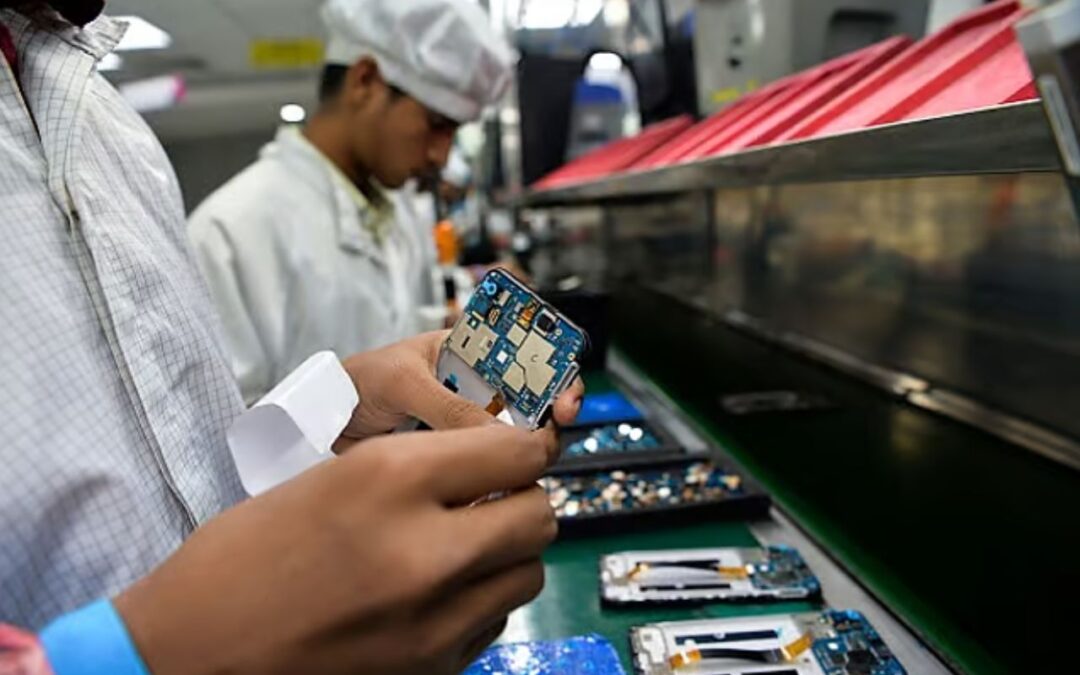Synopsis: India’s electronics manufacturing push is accelerating, supported by rising production, growing exports, and fresh PLI-backed investments. While the momentum is strong, experts stress the need for deeper design capabilities, stronger supply chains, and scaled component ecosystems to achieve sustainable global competitiveness beyond assembly-led growth.
India’s electronics manufacturing sector is rapidly growing, valued at around $132 billion in 2024-25, with production expected to reach $300 billion by 2026. The sector is supported by strong government incentives and rising exports, which crossed Rs 2.87 lakh crore in FY25, showing 35% growth year-on-year. This growth is driven by increasing domestic consumption and improved manufacturing capabilities.
PLI Investment Boost
India’s electronics manufacturing push gained momentum with the government approving 17 new proposals worth over Rs 7,100 crore under the second tranche of the electronic components PLI scheme.
Combined with last month’s Rs 5,500 crore approvals, total cleared investments now stand at Rs 12,700 crore across 24 projects. This strengthens domestic production, reduces import dependence, and supports India’s broader manufacturing ambitions.
Furthermore, the latest round of approvals marks a significant boost for the PLI ecosystem, with Jammu & Kashmir receiving its first sanctioned investment. Major proposals from Uttar Pradesh, Madhya Pradesh, Karnataka, Maharashtra, and Tamil Nadu highlight widening participation across states, strengthening regional manufacturing momentum.
Additionally, Aequs Consumer Products received approvals worth Rs 1,500 crore, while listed firms like Uno Minda and a Syrma SGS subsidiary also secured clearances. Overall, the government expects all approved projects to drive nearly Rs 1.1 lakh crore in production and create over 17,000 new jobs, supporting long-term industrial growth.
Further, strong momentum across India’s PLI ecosystem, with gains extending well beyond electronics players like Dixon, Kaynes and Syrma SGS. Auto sector beneficiaries—Tata Motors, M&M, Ola Electric, Toyota Kirloskar, Bajaj Auto, TVS Motor, Bosch Automotive, Sona BLW and Uno Minda—are set to claim sizable incentives. Tata Motors alone may receive nearly ₹6,500 crore over three years, boosting EV and component localisation.
Strategic Focus
Pankaj Mohindroo, Chairman of the India Cellular & Electronics Association (ICEA), highlighted that India’s electronics sector has achieved significant capacity-building but must now accelerate to remain globally competitive.
He stressed the need for scale, stronger design capabilities, and a robust component ecosystem to support long-term growth. According to him, deeper value addition and local design expertise are essential for India to move beyond basic assembly and become a true global player.
Industry experts view the fresh approvals as a positive step but emphasize the need for a sustained strategy. Ashok Chandak of IESA highlighted that while investor confidence is growing, India must strengthen its core ecosystem. He stressed building robust clusters, deeper supply chains, and strong design capabilities, noting that long-term global competitiveness relies on more than cost efficiency alone.
Conclusion
India’s new PLI investments mark a strong step toward expanding electronics manufacturing, but long-term global leadership will require more than capital infusion.
Building scale, deepening design capabilities, and strengthening component supply chains are essential. With coordinated industry–government efforts, India can progress from assembly-led growth to a high-value, innovation-driven electronics ecosystem capable of competing globally.
Written by Abhishek Singh
Disclaimer

The views and investment tips expressed by investment experts/broking houses/rating agencies on tradebrains.in are their own, and not that of the website or its management. Investing in equities poses a risk of financial losses. Investors must therefore exercise due caution while investing or trading in stocks. Trade Brains Technologies Private Limited or the author are not liable for any losses caused as a result of the decision based on this article. Please consult your investment advisor before investing.


